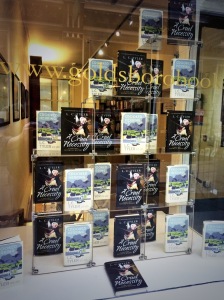Tags
Allison and Busby, Constable and Robinson, DHH Literary Agency, Historical crime fiction, L.C.Tyler, Samuel Pepys, The Tudors
Let me be honest – and it’s usually as well to come clean in these matters – I set my latest book in 1657 because there seemed to be a bit of a gap in the market. The problem with historical crime fiction, as I scarcely need to point out, is that there are few periods that have not already been done. Victorian, Regency, Restoration, Tudor, Wars of the Roses, twelfth century – all covered. Especially Tudor. Then I thought: Commonwealth Interregnum – surely they’ve left me that at least? So I headed off to the British Library to start researching Early Modern crime. Subsequently, of course, I discovered Lindsey Davis’s Rebels and Traitors. And Ian Pears’s An Instance of the Finger Post. Others had got there first. But by that stage it was too late – I was committed to the seventeenth century.
And I was committed because, having done the research, I rather felt I’d struck chronological gold. In the late 1650s, Cromwell’s rule was coming to an end and nobody knew who would succeed him. Would the Stuarts be restored or would it be more of the same? Who should you back? The rewards for guessing right were potentially enormous – land, titles, cash, influence. But the penalties for guessing wrong could include a traitor’s death (not the best way to go). It was a matter of switching sides at the right time.
To be fair, the smart money was still on a republic. Things did not look good for Charles II. The Sealed Knot – the most inefficient guerrilla organisation ever set up – was hatching one tragic failed royalist uprising after another. (See note above on the penalties for getting things wrong.) Their plots failed because half of the Sealed Knot had already gone over to Cromwell and were spying on the other half. But at the same time one of Cromwell’s most senior spies was about to become a secret royalist … They were interesting times all right.
After the Restoration, of course, everyone discovered they had been a secret royalist all along. Charles, as big a cynic as you could wish for, later commented that if he’d only known the country was so full of royalists, he’d have returned long since.
Plenty of scope for treachery, deceit and murder then in the dying days of the Republic, including (in A Cruel Necessity) a dead spy on a dung heap, a mysterious signet ring and a magistrate strangely reluctant to investigate.
But I’d planned my series would run until well after the Restoration. A decade of Cromwellian puritanism and intrigue would be followed by twenty years of partying. On then to the 1660s, which would prove be an immoral age in every sense. Nell Gwynn and Lady Castlemaine were able to turn being a harlot into a viable career option. As a civil servant, Samuel Pepys was careful to include in his salary calculations the bribes that he was expecting to receive. Had he been able to monetise the sexual favours he was able to call in, he would have made the Sunday Times Rich List. Few women were safe from his advances. One had to fight him off with a hatpin – and that was during a church service. Merrie England indeed.
And yet, as I watched these laced and doubleted characters strut their stuff across the 1650s and 60s, I found that they were somehow familiar – and not reassuringly so. The mislaying of a moral compass, the corruption in high places, the sexual impropriety, people working out which party to switch their allegiance to … These things have parallels in stories that have appeared in the press far more recently. Incidentally, Pepys’s maid was quite literally grooming him when his wife caught them together – it was however what Pepys was doing to the maid while he was being groomed that caused problems.
So perhaps the seventeenth century was not such a random choice after all. Perhaps we have something of an affinity with those devious, cut-throat times. There is certainly growing interest in the period – as witness both Lucy Worsley’s BBC series on restoration women and the recent ITV programmes on the Great Fire. And Pepys’s hand is everywhere (so to speak). Are the Stuarts the new Tudors? I do hope so. And if they are, then remember – you read it here first.
L C Tyler’s A Cruel Necessity is Goldsboro Books’ Book of the Month for November. You can buy it here
Crooked Herring is also available from Goldsboro Books
Follow Len on twitter: @lenctyler




Excellent post! My books are set in the 17th century as well and I am definitely seeing more of them around. I think you’re right — we’re just ahead of the game! 😉